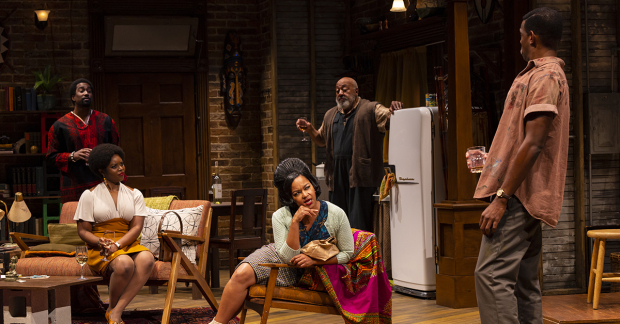Review: Two River Revives a Long-Overlooked Alice Childress Play With Wine in the Wilderness

(© T Charles Erickson)
In 2014, Two River Theater got a jump-start on the theater world's renewed interest in Alice Childress when they presented her sharp entertainment-industry satire Trouble in Mind, nearly a decade before its belated Broadway debut. The Red Bank, New Jersey-based company continues its exploration of her work with Wine in the Wilderness, a short and speculative play from 1969 that considers trenchant social issues within an intimate, tender frame. This superb production unites Childress with a pair of Two River's most devoted collaborators, Brandon J. Dirden and Crystal A. Dickinson, who deliver a strong argument for continued exploration of this playwright's canon.
Dirden's direction transports the audience to Harlem at the close of a tumultuous decade, where the noise of a roiling riot can be heard beyond the walls of Richard H. Morris Jr.'s meticulously detailed apartment set. (Kay Richardson designed the engrossing sound effects.) Amid the chaos, painter Bill Jameson (Korey Jackson) struggles to complete a triptych chronicling Black womanhood in all its idealized beauty and contemporary degradation. After composing the central panel that gives the play its title – a regal goddess who represents the stolen world of true African culture – he seeks a model to represent "the lost woman, as far from my African queen as you can get and still be female."
Enter Tommy (Dickinson), a brash and self-possessed neighbor seeking refuge from the turmoil outside. Bill initially clocks her as the perfect foil to complete his project. Costumed by Karen Perry in a plaid skirt and bobby socks, and wearing an unflattering flip wig designed by Nikiya Mathis, she stands defiantly apart from Bill and his friends Sonny-Man (Ricardy Fabre) and Cynthia (Brittany Bellizeare), who are invested in reclaiming their roots within the Black Is Beautiful Movement. And though Tommy talks a mile a minute, rarely letting anyone else catch air in the room, Childress layers the character with insight and understanding that gradually peels away the biases and misunderstandings beneath Bill's supposedly enlightened thinking.
Although the play features five characters – including Oldtimer, a small-time crook with a heart of gold played by Keith Randolph Smith – it functions essentially as an extended dialogue between Tommy and Bill. Beneath her bravado, Tommy longs to find companionship and be taken care of after a lifetime of sticking up for herself. Bill offers the potential of an equal partnership by seeing her true character through her artifice. Gradually, it becomes clear that the flesh-and-blood woman standing before him is worth more than any fictionalized idol. In turn, Tommy teaches Bill to interrogate the white, Western standards that he has unconsciously embedded into his artwork.
Jackson and Dickinson strike sparks from the moment they come onstage. Bill's arrogance can almost seem intoxicating in Jackson's suave performance, but when he ultimately realizes the small-mindedness behind much of his thinking, it feels like a genuine conversion. Although Tommy speaks at length about everything from Chinese food to the history of Black men within the Benevolent and Protective Order of Elks, Dickinson does career-best work even when she isn't saying a word. A scene in which Tommy, shrouded behind a screen, listens to Bill extol her virtues in a phone call to a friend is a classic study in theatrical listening: Dickinson's wildly expressive face, lit tenderly by Kathy A. Perkins and Christopher Gilmore, says it all.
This is the fourth production of a Childress play I've seen in less than a year, and the second Wine in the Wilderness. Each exposure fills me with gratitude that her work is finally receiving its due, and it enrages me that a playwright with this level of talent was neglected for so many years. One of the central messages of this particular play, though, is that it's never too late to welcome change. We should all be thankful that Wine in the Wilderness is lost in the wilderness no more.











